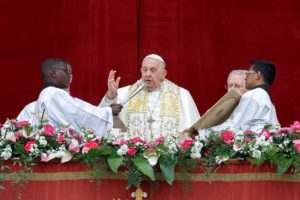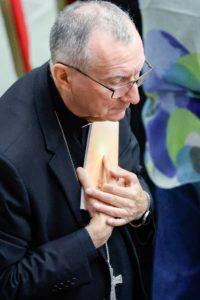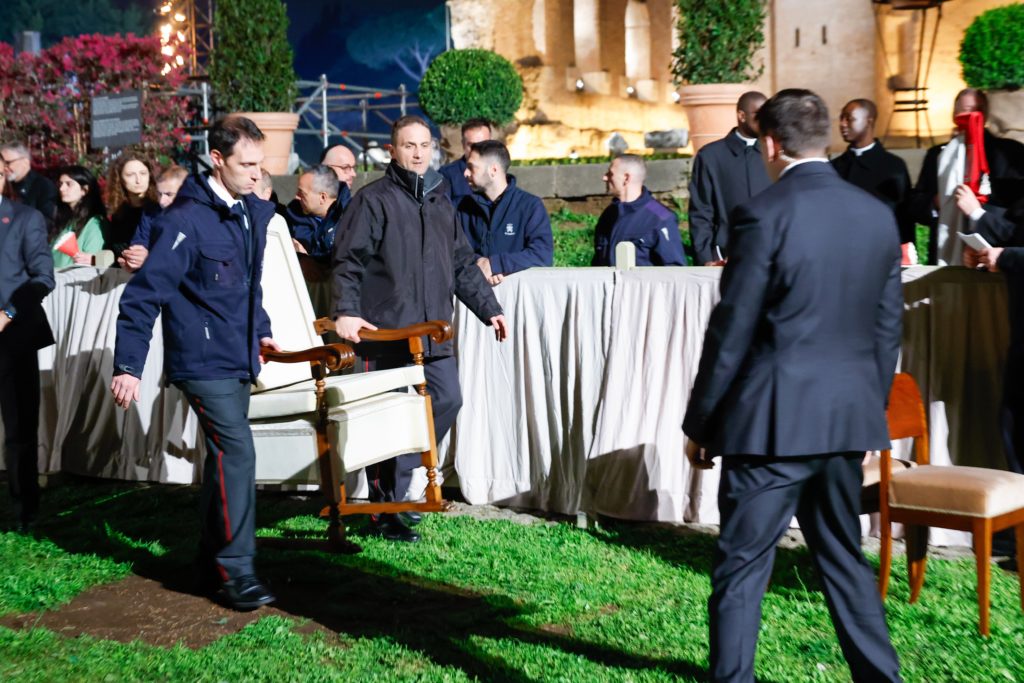ROME — Such is the frenetic nature of the Pope Francis papacy that even though Good Friday was less than a week ago, just a few days later it was hard to remember that it actually produced news. In the meantime, of course, we’ve had not only the pontiff’s traditional Easter activity but his latest tell-all interview book, once again, for a moment, transforming the papacy into a species of reality TV.
In this instance, Francis lifted the veil on the inner workings of two conclaves, those of 2005 and 2013, and also dished on his predecessor’s top aide, German Archbishop Georg Gänswein, claiming that he lacks “nobility and humanity” for the way in which he allegedly tried to pit Pope Benedict XVI against Francis.
As Italian journalist Massimo Gramellini put it, “At bottom, Bergoglio [the pope’s given name] is no more than a man of his times. We live in an era in which, some more and some less, we’re all exhibitionists, devoured by an insatiable need to make our lives public, in the hope of being appreciated and understood.”
Despite all that, it’s still worth returning to Good Friday for a moment, because it produced an iconic image of the late stages of the Francis papacy: An empty white chair at Rome’s Colosseum, where the pontiff had been scheduled to preside over the traditional Way of the Cross procession, but where he ended up being a no-show at the last minute due to health concerns.
In a way, it was odd that anyone ever seriously entertained the idea that the 87-year-old pope would physically attend the Via Crucis (Stations of the Cross) on a chilly yet humid Roman evening, exactly the wrong conditions for someone struggling to kick the after-effects of a series of colds, flu, and bronchitis. In all probability, it was likely Francis’ determination that kept the possibility alive until the very last moment, and which led to the specter of his empty chair having to be carted away in front of live TV cameras.

To be sure, Francis promptly bounced back, as he has after multiple health scares before. He presided over the Easter vigil Mass Saturday evening, the Easter morning Mass on Sunday, and then delivered his traditional Urbi et Orbi message (“to the city and to the world”), all 1,300 words of it, in his own voice. All in all, it did not seem like the specter of a pope on death’s door.
Yet, the empty chair of Good Friday remains as a reminder that, more and more, the price of Francis being able to perform in key moments as he did on Easter is scaling back, or skipping altogether, other aspects of his usual activities.
Where that gradual withdrawal will be most obvious to the naked eye will be missed public moments: General Audiences he decides to shorten or skip, for instance, or international trips he doesn’t take, or traditional liturgical celebrations he hands off to someone else.
Yet there’s a sense that the pope’s being out of the public eye is only the tip of the iceberg, because a limited Francis will translate quickly into limited Church governance.
We’ve seen popes publicly decline before, most recently during the final years of St. Pope John Paul II. His increasing frailty had consequences for ecclesiastical administration, most notably with regard to the clerical sexual abuse crisis, which erupted into full public view in the United States in 2002. Vatican officials from that era will tell you important decisions sometimes were either delayed or resolved with only half-measures, on the basis that “we can’t bother the pope with this right now.”
Yet in a routine sense, you almost wouldn’t have known that the pope was struggling. Bishops continued to be appointed around the world, teaching documents continued to be issued (including the encyclical letter “Ecclesia de Eucharistia” (“The Church from the Eucharist”) in 2003), legal decrees were promulgated, disciplinary decisions were made, and in general the ecclesiastical trains continued running on time.
To a great extent, that was because John Paul was never terribly interested in internal governance, even when he was in the flush of health. He was a decidedly ad extra pope, engaged in the broad human questions of his time, and had relatively little patience for the minutiae of management. As a result, he delegated.
He had a powerful priest secretary, Archbishop (later Cardinal) Stanislaw Dziwisz; a commanding Secretary of State, Cardinal Angelo Sodano; and his key intellectual potentate in Cardinal Joseph Ratzinger. He also had stocked the Vatican with strong department heads, each capable of moving the levers of power in the general direction the pope desired but without requiring his input on the particulars.
Things are quite different today, as Francis very much wields the reins of governance himself.

Francis has clipped the wings of his Secretary of State, Cardinal Pietro Parolin, making him more of a diplomatic mouthpiece than a genuine prime minister. He essentially dissolved the role of the priest-secretary, having two or three clerics handle pieces of the job rather than entrusting it all to one central figure, and rotating them in and out every few years. Francis also works around the established departments of the Vatican at least as much as he does through them, lessening their capacity to take up the slack someday if needed.
This is both the blessing and the curse of a highly engaged pope: Nobody has to guess who’s really pulling the strings, but equally, there’s no one else to pull them when the pope’s hand is missing.
Whether a slowdown in governance as Francis’ limits become more pronounced is positive or negative may depend, as with most things, on point of view. If you’re the kind of Catholic who believes the Church has been on Mr. Toad’s Wild Ride for the past 11 years and could do with a breather, you may welcome a slowdown; if you’re a Francis aficionado anxious to see him nail down as much of his legacy as possible, then all of a sudden his do-it-yourself-style papacy may seem a drawback rather than a strong suit.
However one chooses to look at it, the bottom line seems the same: As Francis increasingly leaves his chair empty, the Vatican — and the broader Church — will slow down. Some of that’s inevitable no matter who’s in charge, but the effect will be more pronounced on his watch, which is a natural byproduct of his imminently hands-on approach.

